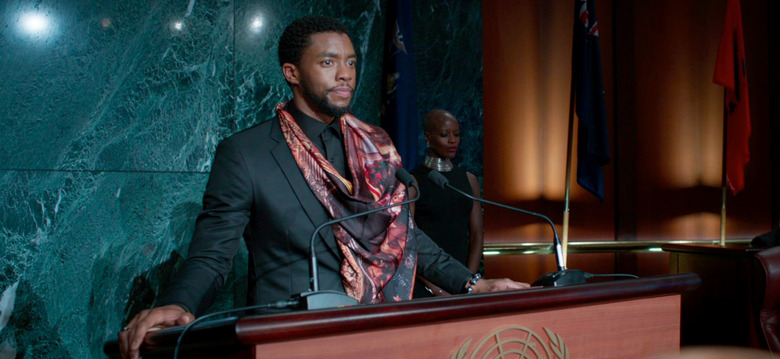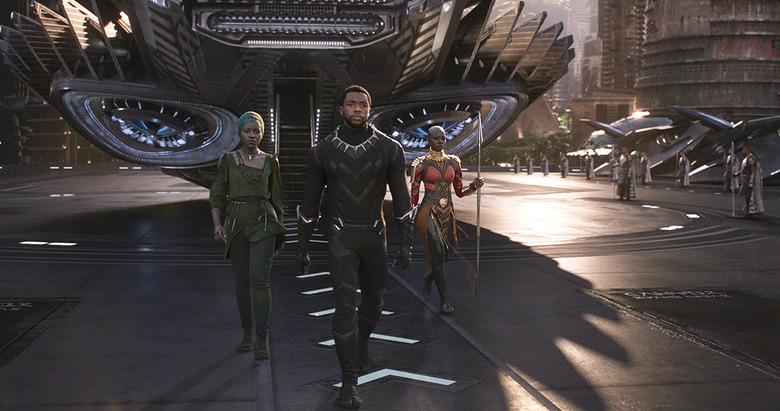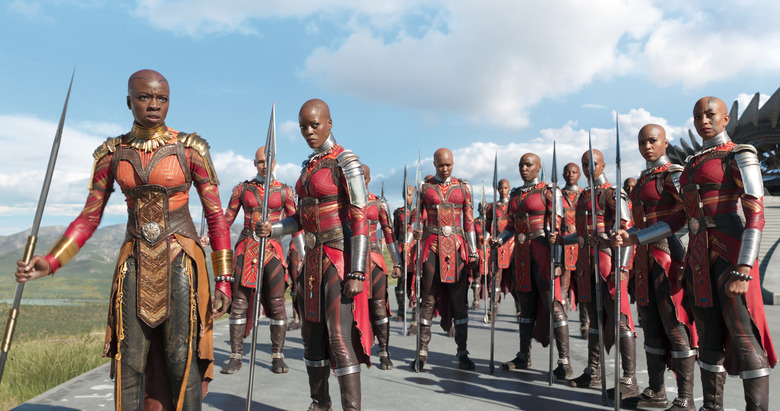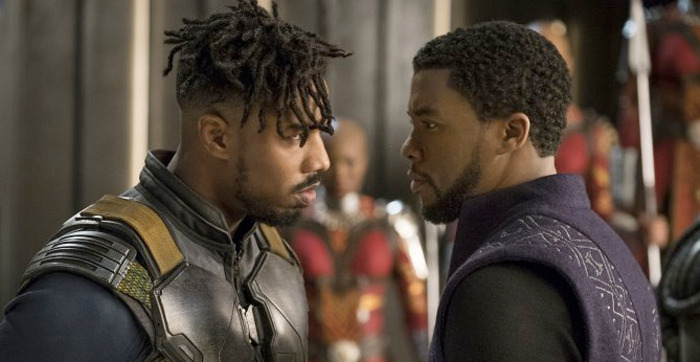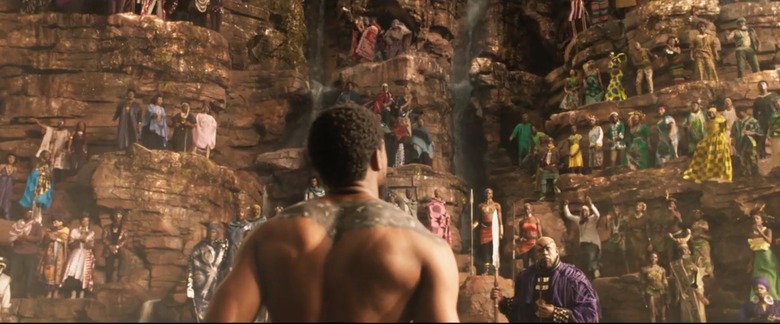'Black Panther' Spoiler Review: Diving Deep Into Marvel's Best Movie
(In our Spoiler Reviews, we take a deep dive into a new release and get to the heart of what makes it tick...and every story point is up for discussion. In this entry: Ryan Coogler's Black Panther.)
Let me start with this: Run, don't walk, to the theater to see Black Panther. This is not hyperbole. It's just that good. Heck, saying it's just "good" is underselling it.
Black Panther is not only Marvel Studios' best superhero film to date, it's also an immediate shoo-in for one of the best films, if not the best film, of 2018. It's only too easy to say director Ryan Coogler's vision for Black Panther has simply moved the needle in terms of representation. What Coogler has done is create a space that didn't exist before, a space for specifically black diasporic stories to have space on the big screen.
The distinction between "black" and "black diasporic" is an important one to make. Up until now, the mainstream has assumed "black" means a catch-all experience that can be boiled down to stereotype. But in actuality, our experiences as a people are much more diverse. In some ways, I think we ourselves forget just how rich and differentiating our life experiences as black diasporic people can be. But Black Panther tells a story that doesn't just slap black faces on the front of a poster. This story is about the push and pull between black diasporic peoples as a whole, specifically the relationship between the African-American and the native African. In this way, the film is transcendent.
This story isn't just meant for black viewers, though; Black Panther can definitely be used as an entryway by all into understanding more about Africa and the African diaspora. Just as important is the film's ultimate message of empathy for everyone's struggles, regardless of societal, racial, and ethnic divisions.
A Marvel film that isn’t a "Marvel film"
This doesn't get said a lot whenever Marvel releases a new film, but we can be honest with each other and recognize that Marvel has a formula with these MCU things, right? Counting race out of it (because it's obvious every Marvel film so far has had a white male lead), the film usually follows the formula of showcasing a competent-or-above-average guy who somehow falls on hard times or somehow doesn't realize his true potential. Then they go on a journey and, through hijinks, a lady, and that specific brand of Marvel Bro humor, find themselves and can finally become a bonafide Hero.
That was the formula, until Black Panther. This film still shows the journey of a man, but the film completely sidesteps the traditional MCU formula. This is not just a popcorn movie whose purpose is to advance a decade-long production plan.
Black Panther finally gave me what I expected from Thor, which is a drama on Shakespearean scale. The film doesn't focus on T'Challa (Chadwick Boseman) learning the ropes of being king in a off-handed way; there's a real weight put to T'Challa's trials to prove himself worthy. There are also real stakes. Whereas the action in latter-day Marvel films like the Avengers series show horrifying loss of life without any consequences whatsoever, Black Panther always reminds you that T'Challa is responsible for everyone in his kingdom, and that responsibility is heavy.
A call to action for the African diaspora
The emotional core of Black Panther is one that takes this movie out of the realm of traditional Marvel fare and places it on a pedestal of its own. There are plenty of indie films that cover the experience of being part of the African diaspora, but this is the first time in my memory that a mainstream film – a superhero film, no less – has captured the multifaceted experiences of being part of the diaspora in a way that didn't solely focus on slavery or black trauma. Yes, trauma does define the film's story, but thankfully, it's not the only driving force the movie has when showcasing blackness. There's a celebration of pan-Africanism, seen in the varied costumes, sets, and the design of Wakanda itself. The film sends a message to its African diasporic audience that whether or not you know your ancestors' homeland, you can be proud to call yourself African.
I'd go as far as to say it's hugely important for those of us in the diaspora, African-Americans in particular, to assert our Africanness. As we can see through Erik Stevens, AKA Killmonger (Michael B. Jordan), the shared trauma African-Americans have is exacerbated by how lost and separated we feel from our ancestors' home. That wound is deepened even further when Africans themselves use the same prejudicial labels and stereotypes white America has used against us.
The rift is manifested in T'Challa's father T'Chaka (Atandwa Kani, with the role played later by John Kani) and his ultimate betrayal of his brother N'Jobu (Sterling K. Brown). While N'Jobu is described by T'Chaka as becoming "radicalized" by his time in America, T'Chaka's the one who refused to understand the hardships N'Jobu has witnessed. Instead of willing himself to see his brother's side, he considers him a traitor and kills him in an effort to protect young Zuri (Denzel Whitaker, with the role later played by Forest Whitaker). T'Chaka doesn't even contemplate N'Jobu's son, young Erik (Seth Carr). Even though Erik is half Wakandan, T'Chaka considers him an outsider and fails to take him back to his father's homeland. Every opportunity given to T'Chaka to do the right thing by N'Jobu and Eric – and by extension give honor to the African diasporic experience – is neglected. T'Chaka fails, and all of the diaspora fails when we turn on each other and forget our shared pain of colonialism and slavery.
The most powerful message the diaspora can take away from Black Panther is that we all must see ourselves in each other. We can not afford to divide ourselves any longer. The film calls us to band together to heal each other, otherwise, we're only doing the colonizers' work for them.
Women rule
How can one Marvel movie have more female representation than all Marvel movies combined? That's both a positive declaration for Black Panther and a damning statement for Marvel's films pre-Wakanda. I know why Marvel strayed away from proper representation of women in their films – for too long, major studios believed the only market for superhero films were men and white men in particular. The comic book industry as a whole believed this; most superheroes are white men, and the women, regardless of their race, are sexualized and ill-defined, often only there to be the damsels the heroes have to save. It's toxic masculinity at its most marketable.
However, Black Panther is a film that breaks with that insulting tradition. The film could have easily focused on the men of Wakanda, but instead, the women are given the forefront. They are the warriors, the technological minds, and the shapers of a country. While T'Challa is the king, the women around him are just as in control of Wakanda as he is.
T'Challa himself is a break from the traditional Marvel hero. Other Marvel films feature heroes who only relate to women in romantic terms, thereby flattening the types of relationships they could have with female characters. The woman herself is also flattened into a stereotype; instead of being a well-rounded character, she's just an object that does emotional labor for the hero. However, T'Challa has complex relationships with every woman in his life. He's not intimidated by female prowess; in fact, he welcomes the presence of strong women in his life, from his Dora Milaje bodyguards and his spy girlfriend Nakia (Lupita Nyong'o) to his mother Ramonda (Angela Bassett) and his and overprotective little sister Shuri (Letitia Wright). Even half of his royal counsel are women. Aside from Captain America, T'Challa is the only other Marvel superhero who truly views women without bias. He sees them as true equals, which is so refreshing.
The women themselves are multifaceted. Shuri might be a princess, but she's also a technological genius who delights in making fun of her brother. Nakia is romantically linked to T'Challa, but she is her own person, refusing to marry him for the sake of her drive to protect as many people around the world as she can. Okoye might be the general of the Dora Milaje, but she's also a woman in love with W'Kabi (Daniel Kaluuya), Wakandan head of the border tribe and T'Challa's best friend. Despite her love for him, she is never shown as weakened because of it; on the contrary, she tells him she'll kill him "without question" if it's a matter of his life over the sanctity of Wakanda. It's telling that both T'Challa and W'Kabi respect and love their partners' independence, never forcing them to confine to submissive roles.
Black Panther's female cast shames the rest of the MCU, and hopefully because of this, Marvel will endeavor to create better roles for women going forward. It shouldn't have taken a decade for the studio to announce female-led films like Captain Marvel and Black Widow. Thanks to Black Panther, Marvel now knows there is a market for films starring female superheroes.
Killmonger’s plight
I'm joining the chorus of critics who say Marvel has finally fixed their villain problem with Killmonger. Killmonger is, indeed, the most sympathetic Marvel villain ever, handedly stealing Loki's mantle. What makes Killmonger so relatable is that his struggles are the same struggles many African-Americans wrestle with throughout their lives.
Yes, his story is universal in that he was abandoned as a child by his own family, but the cultural specificity of his trauma is what makes him less of a villain and more of a "revolutionary" (to use Michael B. Jordan's description) gone astray. Killmonger represents the pain of a people who have lost their heritage through colonization and enslavement, and that feeling of being lost has survived through the centuries, still affecting us who struggle to find their way in a society that still functions on the code set up by colonization and Jim Crow. While his method to find himself results in inexcusable violence, his yearning for a place to call home is a real existential wound many African-Americans have.
Even Kilmonger's violence towards others, including his violence towards black women, can be seen as a byproduct of white supremacy's psychological effects on the African diaspora. Much of what is colloquially called "black on black crime" is a manifestation of misplaced anger resulting from unresolved mental wounds passed down through generations. The transference of hatred from slave master to slave has become its own American legacy, resulting in the collective black body to have a perverse yearning to destroy itself through various means.
Killmonger exhibits the same self-destructive bent, killing his black girlfriend and as he himself said, his own African brothers and sisters. It makes sense to many viewers that Killmonger isn't a villain in the traditional sense because he is also a victim himself. He is an astute and tragic commentary on the state of the unhealed black psyche coupled with internalized self-hate and supremacist tactics.
“We are all one tribe”
There is so much to parse through with Black Panther, making it hard for me to even classify this as a "Marvel movie." I know the term "Marvel movie" isn't supposed to be a pejorative, but when you compare Black Panther to other Marvel films, what else can I say?
But ultimately, Black Panther's crowning achievement is its message of togetherness and equality. As T'Challa comes to understand and ultimately preaches to the U.N., we should all treat each other as if we are of one tribe. Seeing how all of life sprung from Africa, it makes sense that we should all treat each other as we would treat an immediate member of our family. Some would say that's impossible. But it's only impossible because we declare it so. Yes, we are all human and we're not going to get along with everyone all of the time. But what does family do if not talk out their problems and help each other?
We should all meditate on T'Challa's message and think about how our supposed divisions keep us isolated from each other, much like how Wakanda kept itself isolated for fear of the outside world. Their fear is certainly reasonable, seeing how colonization ravaged Africa as much as it has ravaged other parts of the world, but when does fear stop being protective and becomes damaging? For Wakanda, and for everyone, the answer is when fear prevents us from seeing the plight of others as our own. It's heartening to see T'Challa learn from Killmonger's story and advance Wakanda's legacy outside of its borders by purchasing the building where Kilmonger's life changed forever and turning it (and two other adjacent buildings) into Wakandan outreach centers. Africa has reconnected with its lost family.
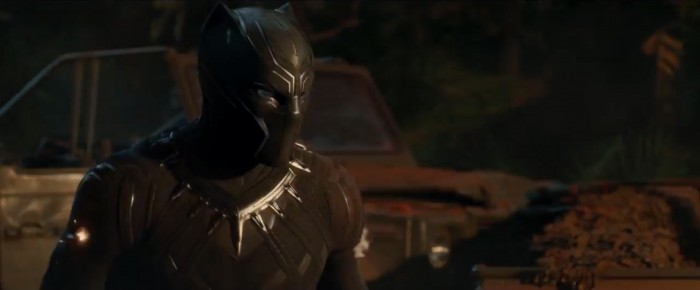
I hope Black Panther spawns much-needed conversation between us African diasporic people and our native African cousins. I hope the film helps us come together in a much more meaningful way. But I also hope it helps bring the world together as well; as T'Challa said, the wise build bridges and the foolish build barriers (looking at you, Trump). At this critical juncture in human history, we need to build bridges any way we can.
In short, Black Panther is a masterpiece. I am not lying when I say I welled up three times. It makes total sense why folks are crowdsourcing to send kids to see this movie. It makes sense why folks dressed in pan-African clothes to see this film in style. Black Panther is more than just a movie; it's a spiritual experience. In Captain America: Civil War, Ayo (Florence Kasumba, who is of course a returning face for Black Panther), says "Move or you will be moved." That line applies in spades for Black Panther when it comes to your emotional state. You will have already been moved before even sitting down in the theater, or you will be moved by the time you leave.

